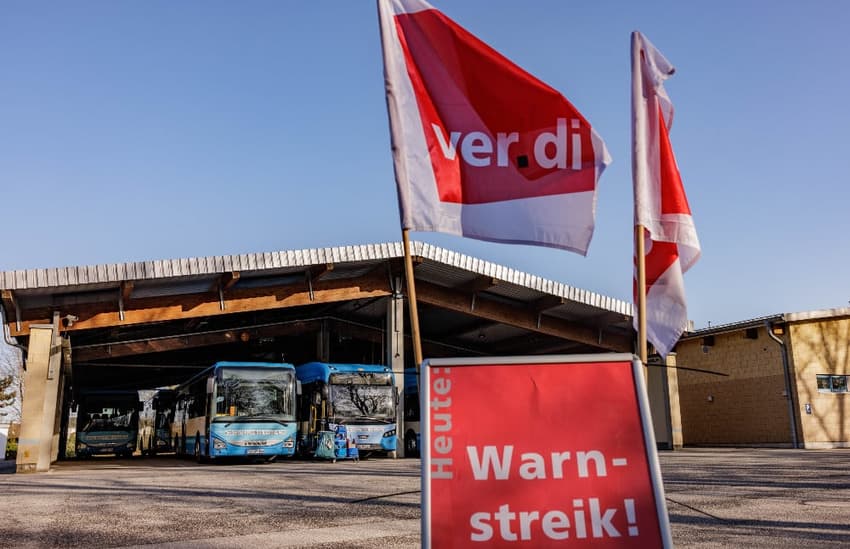More public transport disruption as workers around Germany strike

In parts of Germany's public transport system, passengers will have to prepare for cancellations and delays on Wednesday.
This is due to mostly all-day warning strikes by union Verdi at some transport companies in the states of Schleswig-Holstein, Lower Saxony, North Rhine-Westphalia, Bavaria and Baden-Württemberg.
By noontime, over 1,200 transport employees were taking part in the actions, according to Verdi.
Several regional transport companies were affected, including in the district of Plön in Schleswig-Holstein, Regiobus Hannover, the port of Cologne, Oberbergische Verkehrsgesellschaft and RheinCargo in North Rhine-Westphalia, Kahlgrund Bahn in Bavaria and SWEG Südwestdeutsche Landesverkehrs-GmbH in Baden-Württemberg.
The southwest state of Baden-Württemberg was set to be among the most affected: transport operator SWEG run services across large swathes of the state from Karlsruhe to Heidelberg.
SWEG announced that it would try to minimise the impact, but that cancellations of services were to be expected in large parts of its transport area, which extends throughout the state.
Many school buses were also affected by the warning strike, particularly affecting Gymnasium students taking their Abitur university entrance exams on Wednesday.
Why are there more transport strikes?
Verdi wants to put pressure on the negotiations for the collective pay agreement on railways (ETV), which applies to about 40 transport companies with about 5,000 employees.
"The strikes send a clear message: the more prices continue to rise, the more the willingness to strike increases", said Verdi negotiator Volker Nüsse in a statement on Wednesday. "With today's action, we are sending a first signal and putting pressure on the negotiations next Friday."
They are not covered by the collective agreement for the federal and municipal public service, for which an agreement was reached at the weekend for a 5.5 percent annual pay hike - potentially ending months of public sector strikes.
READ ALSO: German public sector workers clinch 5.5 percent pay rise
The Verdi negotiations also have nothing to do with the current collective bargaining at Deutsche Bahn and other railway companies, which is currently being conducted by the train and transport union EVG.
The union is demanding an increase in wages and salaries for the employees of €550 per month for a period of twelve months. Pay would trainees and working students would go up by €250.
READ ALSO: More rail strikes planned Wednesday in Germany: How long will they last?
Comments
See Also
This is due to mostly all-day warning strikes by union Verdi at some transport companies in the states of Schleswig-Holstein, Lower Saxony, North Rhine-Westphalia, Bavaria and Baden-Württemberg.
By noontime, over 1,200 transport employees were taking part in the actions, according to Verdi.
Several regional transport companies were affected, including in the district of Plön in Schleswig-Holstein, Regiobus Hannover, the port of Cologne, Oberbergische Verkehrsgesellschaft and RheinCargo in North Rhine-Westphalia, Kahlgrund Bahn in Bavaria and SWEG Südwestdeutsche Landesverkehrs-GmbH in Baden-Württemberg.
The southwest state of Baden-Württemberg was set to be among the most affected: transport operator SWEG run services across large swathes of the state from Karlsruhe to Heidelberg.
SWEG announced that it would try to minimise the impact, but that cancellations of services were to be expected in large parts of its transport area, which extends throughout the state.
Many school buses were also affected by the warning strike, particularly affecting Gymnasium students taking their Abitur university entrance exams on Wednesday.
Why are there more transport strikes?
Verdi wants to put pressure on the negotiations for the collective pay agreement on railways (ETV), which applies to about 40 transport companies with about 5,000 employees.
"The strikes send a clear message: the more prices continue to rise, the more the willingness to strike increases", said Verdi negotiator Volker Nüsse in a statement on Wednesday. "With today's action, we are sending a first signal and putting pressure on the negotiations next Friday."
They are not covered by the collective agreement for the federal and municipal public service, for which an agreement was reached at the weekend for a 5.5 percent annual pay hike - potentially ending months of public sector strikes.
READ ALSO: German public sector workers clinch 5.5 percent pay rise
The Verdi negotiations also have nothing to do with the current collective bargaining at Deutsche Bahn and other railway companies, which is currently being conducted by the train and transport union EVG.
The union is demanding an increase in wages and salaries for the employees of €550 per month for a period of twelve months. Pay would trainees and working students would go up by €250.
READ ALSO: More rail strikes planned Wednesday in Germany: How long will they last?
Join the conversation in our comments section below. Share your own views and experience and if you have a question or suggestion for our journalists then email us at [email protected].
Please keep comments civil, constructive and on topic – and make sure to read our terms of use before getting involved.
Please log in here to leave a comment.